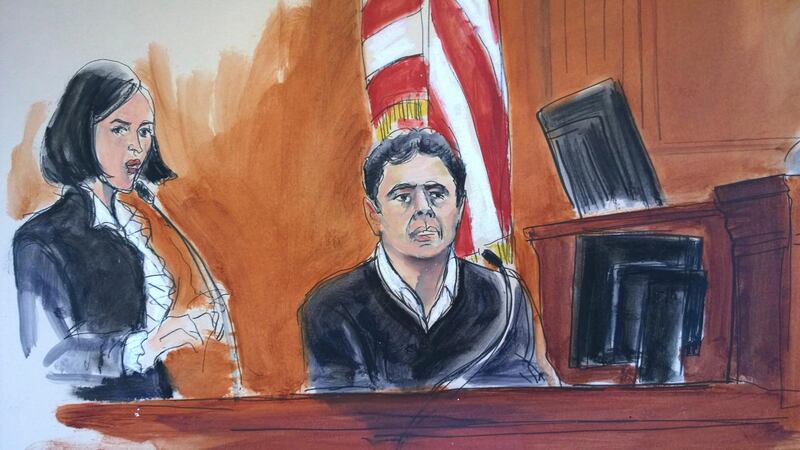For three weeks, Mehmet Hakan Atilla has listened to the evidence against him, including the testimony of a jet-setting gold trader who described how the Turkish banker was the brains behind a complex set of financial deals to allow Iran to evade American sanctions.
The case has attracted international headlines, captivating attention with tales of coup plots, gold bars in suitcases and bribes paid in watches.
On Friday, it was Atilla’s turn. In contrast with the tone so far, he presented himself in Manhattan’s district federal court as one executive among many, with a middling income and a modest family life.
When he was asked by his lawyer whether he was the “architect” of a scheme to allow Iran to access oil money held in Turkish banks, he said simply in Turkish: “I am not.”
American prosecutors have charged nine people with conspiring to help Iran evade sanctions using fraudulent gold and food deals worth hundreds of millions of dollars.
Only two have so far been arrested in the US.
Reza Zarrab, the Iranian-Turkish gold dealer, has pleaded guilty and is co-operating with prosecutors, while Atilla, 47, denies all the charges against him.
He took the witness box in his own defence on Friday, a move that could make or break his case.
His evidence began with a flourish, describing how he was on a flight to Barcelona in April 2013 when he was supposed to have received a crucial phone call.
Zarrab had earlier testified that he saw the general manager of Halkbank telephone Atilla and ask him to put through an illegal transaction.
Cathy Fleming, the banker’s defence attorney, asked where he was at the time of the alleged call.
He answered: “I was on a plane.”
Ms Fleming continued: “Did you receive a call on your cell phone?"
“Never,” came the response.
____________
Read more
Turks in New York riveted by Iran sanctions trial
Gold trader tells court he made $150m from scheme to allow Iran to avoid US sanctions
____________
The defence laid out its strategy in its opening statement at the start of the trial, warning jurors that Zarrab’s desire to reduce his own sentence made him an unreliable witness.
Their plan played out in court on Friday as they presented their client as a man with a modest lifestyle, compared with the government’s star witness whose marriage to a pop star makes him a mainstay of celebrity magazines, and who is reputed to own a string of homes, a private submarine and a $10 million art collection.
Atilla said his income was about $100,000 (Dh367,250) with no opportunities for bonuses. He described how his hobbies included fishing, painting, and camping, as well as watching films and reading.
Dressed in a black V-neck sweater over an open-necked shirt, he briefly choked up as he described his wife of 22 years and college-age son.
He said he had not seen his wife since he was arrested 269 days ago and had spent only two hours with his son.
An interpreter handed him a tissue before he was able to compose himself and continue.
The case has exacerbated tensions between the US and Turkey, which accuses Washington of concocting the allegations for political purposes.
The trial has already heard evidence that former ministers received bribes and that Recep Tayyip Erdogan, when he was prime minister, signed off on two banks being involved in the scheme.
Atilla was arrested in March when he arrived in New York for a series of investor meetings. The prosecution alleges that his role as deputy general manager at Halkbank, a state-owned bank, included expertise in sanctions which he used to construct the complex web of deals to allow Iran to move its money out of Turkish accounts.
However, on Friday, Atilla contradicted the claims, saying he was not particularly expert in sanctions. Instead other departments were responsible for monitoring changes to the international sanctions regime, sending out simple guides to ensure the bank remained compliant.
“They sent this information to any relevant sections or departments … and they would usually translate it to a language we could understand,” he said, as he described his daily routine of meetings with investors at home or overseas.
During a break in evidence, there was a reminder of the way this case has roiled Turkish public life.
Atilla’s defence team had asked Judge Richard Berman to order a mistrial following the appearance of a former Turkish police officer, who had fled Turkey with evidence from his investigation into government officials.
Read more: Canadian-Iranian sentenced to prison for sanctions violations
The attorneys said his account of fleeing the country was “prejudicial” because it suggested Atilla was associated in some way with “cruel political violence”.
Mr Berman denied the request and instead suggested Huseyin Korkmaz’s testimony helped their case, as he had said Atilla had not appeared in surveillance as part of his investigation.
But he also used exceptionally strong language in admonishing the defence for getting on the “conspiracy theory bandwagon” by trying to link Mr Korkmaz to Fethullah Gulen, a US-based cleric blamed by the Turkish government for last year's attempted coup.
Mr Berman said the line of questioning pursued by Atilla’s lawyers had no basis in the evidence presented so far and was “in reality unpersuasive and borderline unprofessional”.






